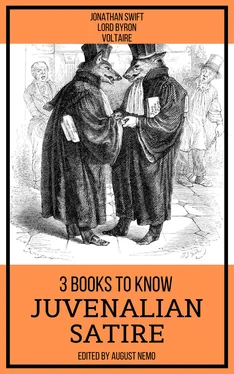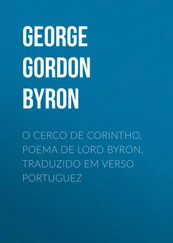Instead of hoarding it with due precision.
The consequence was easily foreseen—
They ate up all they had, and drank their wine,
In spite of all remonstrances, and then
On what, in fact, next day were they to dine?
They hoped the wind would rise, these foolish men!
And carry them to shore; these hopes were fine,
But as they had but one oar, and that brittle,
It would have been more wise to save their victual.
The fourth day came, but not a breath of air,
And Ocean slumber'd like an unwean'd child:
The fifth day, and their boat lay floating there,
The sea and sky were blue, and clear, and mild—
With their one oar (I wish they had had a pair)
What could they do? and hunger's rage grew wild:
So Juan's spaniel, spite of his entreating,
Was kill'd and portion'd out for present eating.
On the sixth day they fed upon his hide,
And Juan, who had still refused, because
The creature was his father's dog that died,
Now feeling all the vulture in his jaws,
With some remorse received (though first denied)
As a great favour one of the fore-paws,
Which he divided with Pedrillo, who
Devour'd it, longing for the other too.
The seventh day, and no wind—the burning sun
Blister'd and scorch'd, and, stagnant on the sea,
They lay like carcasses; and hope was none,
Save in the breeze that came not; savagely
They glared upon each other—all was done,
Water, and wine, and food,—and you might see
The longings of the cannibal arise
(Although they spoke not) in their wolfish eyes.
At length one whisper'd his companion, who
Whisper'd another, and thus it went round,
And then into a hoarser murmur grew,
An ominous, and wild, and desperate sound;
And when his comrade's thought each sufferer knew,
'T was but his own, suppress'd till now, he found:
And out they spoke of lots for flesh and blood,
And who should die to be his fellow's food.
But ere they came to this, they that day shared
Some leathern caps, and what remain'd of shoes;
And then they look'd around them and despair'd,
And none to be the sacrifice would choose;
At length the lots were torn up, and prepared,
But of materials that much shock the Muse—
Having no paper, for the want of better,
They took by force from Juan Julia's letter.
The lots were made, and mark'd, and mix'd, and handed,
In silent horror, and their distribution
Lull'd even the savage hunger which demanded,
Like the Promethean vulture, this pollution;
None in particular had sought or plann'd it,
'T was nature gnaw'd them to this resolution,
By which none were permitted to be neuter—
And the lot fell on Juan's luckless tutor.
He but requested to be bled to death:
The surgeon had his instruments, and bled
Pedrillo, and so gently ebb'd his breath,
You hardly could perceive when he was dead.
He died as born, a Catholic in faith,
Like most in the belief in which they 're bred,
And first a little crucifix he kiss'd,
And then held out his jugular and wrist.
The surgeon, as there was no other fee,
Had his first choice of morsels for his pains;
But being thirstiest at the moment, he
Preferr'd a draught from the fast-flowing veins:
Part was divided, part thrown in the sea,
And such things as the entrails and the brains
Regaled two sharks, who follow'd o'er the billow—
The sailors ate the rest of poor Pedrillo.
The sailors ate him, all save three or four,
Who were not quite so fond of animal food;
To these was added Juan, who, before
Refusing his own spaniel, hardly could
Feel now his appetite increased much more;
'T was not to be expected that he should,
Even in extremity of their disaster,
Dine with them on his pastor and his master.
'T was better that he did not; for, in fact,
The consequence was awful in the extreme;
For they, who were most ravenous in the act,
Went raging mad—Lord! how they did blaspheme!
And foam and roll, with strange convulsions rack'd,
Drinking salt water like a mountain-stream,
Tearing, and grinning, howling, screeching, swearing,
And, with hyaena-laughter, died despairing.
Their numbers were much thinn'd by this infliction,
And all the rest were thin enough, Heaven knows;
And some of them had lost their recollection,
Happier than they who still perceived their woes;
But others ponder'd on a new dissection,
As if not warn'd sufficiently by those
Who had already perish'd, suffering madly,
For having used their appetites so sadly.
And next they thought upon the master's mate,
As fattest; but he saved himself, because,
Besides being much averse from such a fate,
There were some other reasons: the first was,
He had been rather indisposed of late;
And that which chiefly proved his saving clause
Was a small present made to him at Cadiz,
By general subscription of the ladies.
Of poor Pedrillo something still remain'd,
But was used sparingly,—some were afraid,
And others still their appetites constrain'd,
Or but at times a little supper made;
All except Juan, who throughout abstain'd,
Chewing a piece of bamboo and some lead:
At length they caught two boobies and a noddy,
And then they left off eating the dead body.
And if Pedrillo's fate should shocking be,
Remember Ugolino condescends
To eat the head of his arch-enemy
The moment after he politely ends
His tale: if foes be food in hell, at sea
'T is surely fair to dine upon our friends,
When shipwreck's short allowance grows too scanty,
Without being much more horrible than Dante.
And the same night there fell a shower of rain,
For which their mouths gaped, like the cracks of earth
When dried to summer dust; till taught by pain
Men really know not what good water 's worth;
If you had been in Turkey or in Spain,
Or with a famish'd boat's-crew had your berth,
Or in the desert heard the camel's bell,
You 'd wish yourself where Truth is—in a well.
It pour'd down torrents, but they were no richer
Until they found a ragged piece of sheet,
Which served them as a sort of spongy pitcher,
And when they deem'd its moisture was complete
They wrung it out, and though a thirsty ditcher
Might not have thought the scanty draught so sweet
As a full pot of porter, to their thinking
They ne'er till now had known the joys of drinking.
And their baked lips, with many a bloody crack,
Suck'd in the moisture, which like nectar stream'd;
Their throats were ovens, their swoln tongues were black,
As the rich man's in hell, who vainly scream'd
To beg the beggar, who could not rain back
A drop of dew, when every drop had seem'd
To taste of heaven—If this be true, indeed
Some Christians have a comfortable creed.
There were two fathers in this ghastly crew,
And with them their two sons, of whom the one
Was more robust and hardy to the view,
But he died early; and when he was gone,
His nearest messmate told his sire, who threw
One glance at him, and said, 'Heaven's will be done!
I can do nothing,' and he saw him thrown
Into the deep without a tear or groan.
The other father had a weaklier child,
Of a soft cheek and aspect delicate;
But the boy bore up long, and with a mild
And patient spirit held aloof his fate;
Little he said, and now and then he smiled,
As if to win a part from off the weight
Читать дальше












